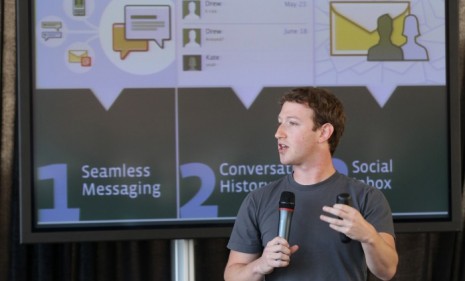Facebook's 'Messages' program: The end of email?
Now that the social-networking giant is venturing into the world of online messaging, will email go the way of handwritten letters?

On Monday, Facebook CEO Mark Zuckerberg took to a California stage to announce the social networking site's latest innovation: A "unified messaging system" that brings together emails, texts, and other communications under one umbrella. For days, the company had been rumored to be preparing an email system that would compete with Gmail, but Zuckerberg quickly attempted to quash that perception, saying that the new system, known as Facebook Messages, "is not an email killer. This is a messaging experience that includes email as one part of it." (Watch a Facebook Messages introduction.) Here's a sampling of commentators' reactions:
Read between the lines — Email is dead: Zuckerberg talked a lot about how "formal" email now seems — and "if you extrapolate that out, that means the end of email," says MG Siegler at TechCrunch. He won't come out and say it, but "it sounds as if Zuckerberg is just tip-toeing around calling for the death of a system that a lot of people currently use."
It's all about the kids: "We agree with Facebook's theory that young people are more likely to take to [Facebook Messages] than the rest of us." says Jacqui Cheng at Ars Technica. They already prefer Facebook messaging over email, and if this new system is also well-integrated with cellphone text messaging "then that's even easier."
The Week
Escape your echo chamber. Get the facts behind the news, plus analysis from multiple perspectives.

Sign up for The Week's Free Newsletters
From our morning news briefing to a weekly Good News Newsletter, get the best of The Week delivered directly to your inbox.
From our morning news briefing to a weekly Good News Newsletter, get the best of The Week delivered directly to your inbox.
It won't solve the problems with email: "Facebook Messages inherits legacy issues from email and messaging systems that came before it, and may even create new problems," says Oliver Chiang at Forbes. Zuckerberg advertised the system's smart filtering function, but what a message is about can be as important as who sent it. Without mastering that distinction, "the system may just become another repository... of digital data."
Facebook's privacy problems are still a concern: The more people start using Facebook's messaging service, the more data Facebook is able to collect," says Zack Whittaker at ZDNet. "And with this comes an even higher risk that your consolidated social lives are at further risk from the counter-privacy brigade."
A free daily email with the biggest news stories of the day – and the best features from TheWeek.com
-
 Le Pen back in the dock: the trial that’s shaking France
Le Pen back in the dock: the trial that’s shaking FranceIn the Spotlight Appealing her four-year conviction for embezzlement, the Rassemblement National leader faces an uncertain political future, whatever the result
-
 The doctors’ strikes
The doctors’ strikesThe Explainer Resident doctors working for NHS England are currently voting on whether to go out on strike again this year
-
 5 chilling cartoons about increasing ICE aggression
5 chilling cartoons about increasing ICE aggressionCartoons Artists take on respect for the law, the Fourth Amendment, and more